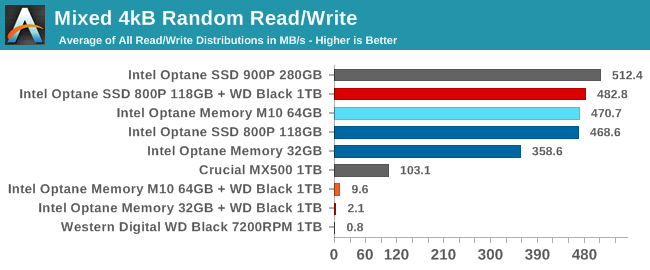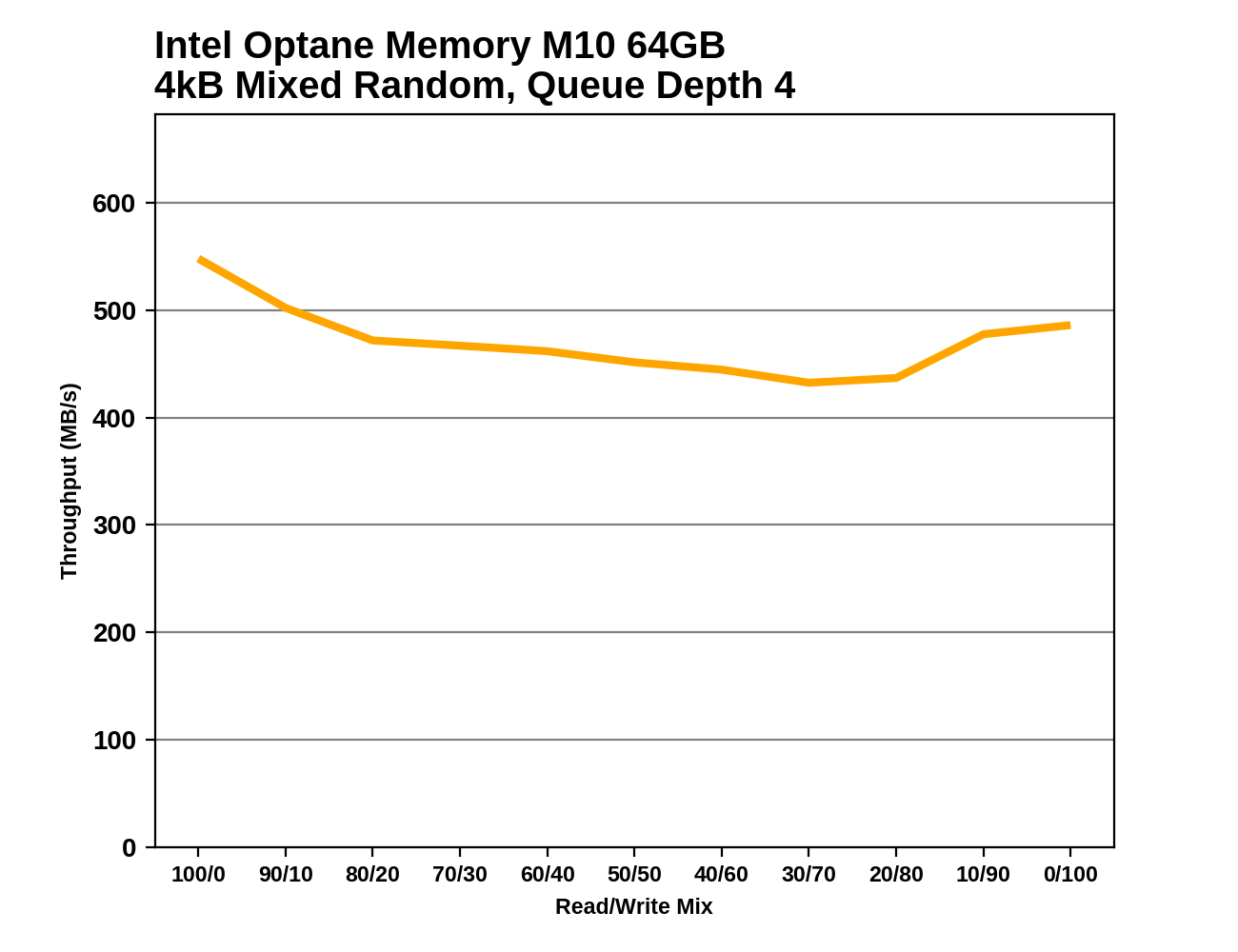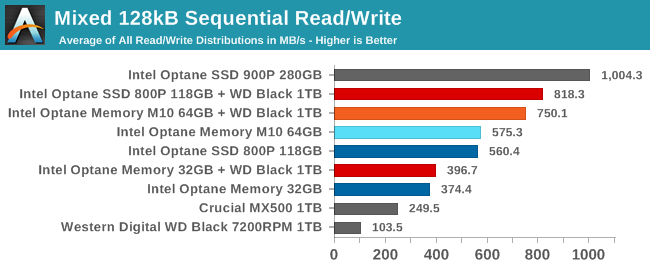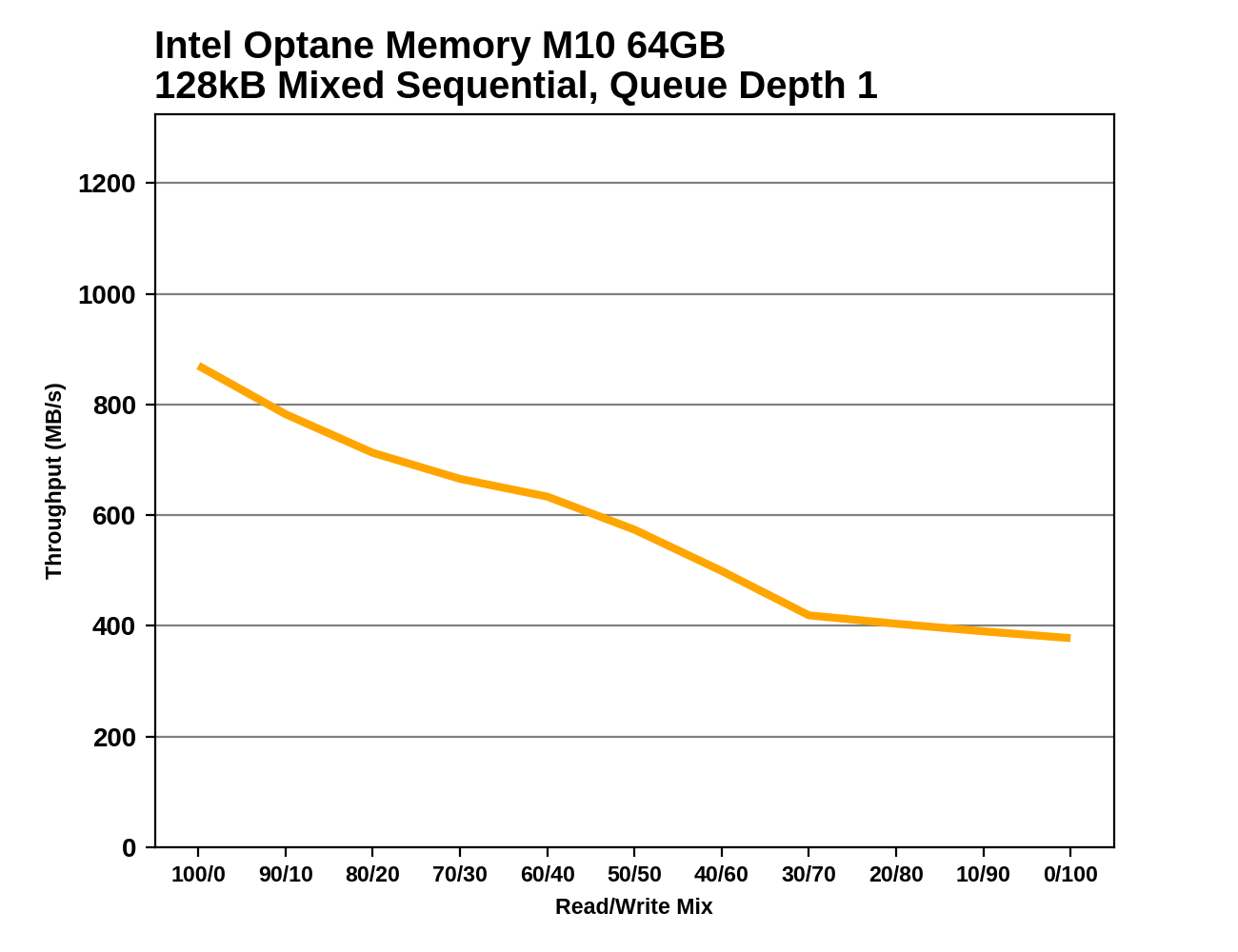The Intel Optane Memory M10 (64GB) Review: Optane Caching Refreshed
by Billy Tallis on May 15, 2018 10:45 AM EST- Posted in
- SSDs
- Storage
- Intel
- PCIe SSD
- SSD Caching
- M.2
- NVMe
- Optane
- Optane Memory
Mixed Random Performance
Our test of mixed random reads and writes covers mixes varying from pure reads to pure writes at 10% increments. Each mix is tested for up to 1 minute or 32GB of data transferred. The test is conducted with a queue depth of 4, and is limited to a 64GB span of the drive. In between each mix, the drive is given idle time of up to one minute so that the overall duty cycle is 50%.

Unsurprisingly, the mixed random I/O test produces crap performance from the hard drive and the two cache configurations where the cache is too small for this test. The 118GB Optane SSD 800P is more cache than this test needs, and it performs almost as well as the Optane SSD 900P.
 |
|||||||||
When used as a cache for this test, the largest Optane SSD 800P shows slightly different performance characteristics than when it is treated as a standalone drive, but in either case it is a strong performer across the board. The smaller Optane drives aren't large enough to cache the entire working set of this test and can't do much to improve performance over the hard drive.
Mixed Sequential Performance
Our test of mixed sequential reads and writes differs from the mixed random I/O test by performing 128kB sequential accesses rather than 4kB accesses at random locations, and the sequential test is conducted at queue depth 1. The range of mixes tested is the same, and the timing and limits on data transfers are also the same as above.

All of the Optane configurations easily outperform the SATA drives on the mixed sequential I/O test. The 64GB and 118GB modules are tied when tested as standalone drives and close when tested as cache devices, and the cache performance is 30-40% faster than the standalone SSD performance. The 32GB module is substantially slower and performance is much closer between caching and standalone SSD use.
 |
|||||||||
The performance improvements in the caching configurations over the standalone drive configurations generally apply throughout the mixed sequential test. The main exception is in the early phases of the test with the 32GB cache, where cache performance falls far short of the standalone drive performance. Once the proportion of reads has dropped to 70%, the cache configuration comes out ahead.










96 Comments
View All Comments
Samus - Wednesday, May 16, 2018 - link
For $160-$170 (<$150 on sale, basically the price of 64GB of Optane) you can get a the WD Black 512GB M2 NVME PCIe SSD that does 2000MB+/sec rear for all 512GB.Why the hell is Optane so expensive. 5-7x the price of traditional NAND?
Arnulf - Wednesday, May 16, 2018 - link
Because it is crap which nobody would buy if it was priced close to SSDs of similar performance and capacity:"It costs 5-7 times more than SSDs, must be something magical about it, let's buy one honey!"
Much like $1000 mobile phones, bait for the stupid.
CheapSushi - Wednesday, May 16, 2018 - link
Because it uses phase change instead of NAND and it's new tech. They're trying to recoup R&D cost.FunBunny2 - Wednesday, May 16, 2018 - link
"hey're trying to recoup R&D cost. "PCM is decades old tech. look it up. throwing good money after bad, just like pharma.
deil - Wednesday, May 16, 2018 - link
I have 8 TB drive AND I would enjoy some speedup as current usual run takes ~~5h full run. With that 32 GB joke drive even if it would not double the speed, Speedup of 20% time is a lot in my case. AND I don't get to redesign anything to use another drive or have to build 8 TB ssd raid.Spunjji - Wednesday, May 16, 2018 - link
On what basis do you think you'll achieve any speed-up, though?tipoo - Wednesday, May 16, 2018 - link
Yeah, I can't see why 5x the NAND for the cost wouldn't almost always be preferable for budget systems.I can only see this making sense for datacenter use.
0ldman79 - Thursday, May 17, 2018 - link
Primocache does the same thing.I've got an 80gig in my desktop, a 60 in an Asus laptop that has two 2.5 bays and a 16gig M.2 in my Inspiron 7559.
I don't use RAM as a buffer, just the SSD. Works great, unless you have an unstable system. Any time you lose power or don't shut down cleanly the cache resets. With the cache, however, my main box boots in about 20-30 seconds, all apps loaded, where as just running the mechanical drive a reboot is nearly a 4 minute affair.
lefty2 - Tuesday, May 15, 2018 - link
Ironically, these drives work better with AMD motherboards than Intel:https://fudzilla.com/news/pc-hardware/46145-amd-st...
CajunArson - Tuesday, May 15, 2018 - link
Where does Idiot-Zilla prove that Optane works "better" with AMD motherboards than Intel?But for a site that starts with "Fud" I will give them credit for dispelling the completely wrong "FUD" that is actually spread by AMD fanboys that Optane is a proprietary technology that only works with Intel products. Never has been proprietary.